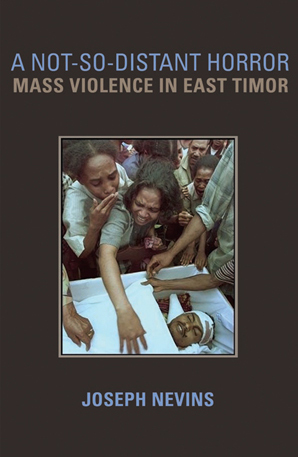 WEST'S HANDS DIRTY IN EAST TIMOR
WEST'S HANDS DIRTY IN EAST TIMOR
By Matthew Jardine (*)
VENICE, CALIFORNIA, JAN (IPS) - ''You cannot deal with the future unless you also come to terms with the past.'' US Ambassador to the United Nations Richard Holbrooke intended these words for his Indonesian hosts before his visit last November to East Timor. But they could as easily pertain to the obligations of the US and other Western countries toward the soon-to-be independent East Timor.
Without a doubt Holbrooke's call for accountability was appropriately levelled at Jakarta. The Indonesian military and its paramilitary allies devastated East Timor in September in the aftermath of the United Nations-run vote on the territory's political future, destroying the vast majority of the country's buildings and infrastructure, and killing untold numbers.
And although the United Nations has assumed political and military control of the territory, many problems remain. As Human Rights Watch reported in mid-December, for example, upwards of 110,000 East Timorese remain virtual prisoners in paramilitary- controlled camps in Indonesian West Timor. The recent discovery of two more mass graves in East Timor only serves to reinforce the importance of Holbrooke's message.
But to be fair, such accountability should and must begin at home. The United States played a significant and, arguably, decisive role in making possible Indonesia's 1975 invasion and almost 24-year illegal occupation of East Timor -- one that resulted in the deaths of well over 200,000 people.
As Cynthia McKinney, the ranking Democrat on the congressional panel on international operations and human rights, stated during a hearing on East Timor in September, ''We have been directly involved in the crimes committed in East Timor by the Indonesian military.''
This involvement dates back to before December 7, 1975, when Indonesian troops launched their bloody full-scale invasion of the territory. President Gerald Ford and Secretary of State Henry Kissinger were visiting Indonesian dictator Suharto in Jakarta two days prior to the invasion and gave him the green light to invade. According to the US State Department, about 90 percent of the weapons used during the invasion were US-supplied.
All successive US administrations generously supported the military regime in Jakarta and facilitated its brutal occupation of East Timor. Over the years of the occupation, Washington provided billions in economic aid, more than one billion dollars worth of weaponry, and tens of millions worth of training and military aid.
It was the Carter administration (1977-1980), for example, that provided Jakarta with OV-10 Bronco counter-insurgency aircraft used to bomb and napalm the East Timorese into submission -- a situation an Australian parliamentary report later described as one of ''indiscriminate killing on a scale unprecedented in post-World War II history.''
One of the principal architects of Carter's East Timor policy was his Under-Secretary of State for East Asian and Pacific Affairs: Richard Holbrooke.
| Connect with ETAN | ||||||||
|
|
 |
|
|
|
 |
 |
|
|
Diplomatically, Washington ensured that the United Nations would not take any meaningful steps to enforce its resolutions demanding that Indonesia withdraw from East Timor. Daniel Patrick Moynihan, Ford's UN Ambassador, bragged: ''The Department of State desired that the United Nations prove utterly ineffective in whatever measures it undertook. This task was given to me, and I carried it forward with no inconsiderable success.''
A State Department official explained in 1976 that the US was ''more or less condoning'' Jakarta's invasion because ''[Indonesia] is a nation we do a lot of business with.''
Such thinking continued to inform US policy toward East Timor through early September 1999. Even in the context of widespread destruction and killings following the announcement of an overwhelming vote for independence, the Clinton administration resisted cutting off military ties and economic aid to resource-rich Indonesia. Only strong grassroots pressure and outrage from both Democrats and Republicans in Congress finally forced the administration to change course.
The US is certainly not alone in its complicity with Jakarta's myriad crimes in East Timor. The United Kingdom, for example, was one of Indonesia's largest arms suppliers during the 1990s. Tony Blair's much-vaunted ''ethical foreign policy'' changed little in this regard. His government went forward with the sale of Hawk ground attack jets, provided training to Indonesia's military, and approved at least 22 new arms export licenses for Jakarta.
Australia went so far as to extend ''de jure'' recognition of Indonesia's brutal annexation of East Timor -- deemed illegal by the UN. Canberra provided significant military training and arms, regularly exchanged intelligence information, and engaged in joint military manoeuvres with Jakarta during the occupation. And perhaps no Western country worked as hard as Australia did to provide diplomatic cover for Indonesia's atrocities in East Timor.
''Accountability is one of the two or three keys to democracy,'' Richard Holbrooke stated during his visit to Indonesia. Indeed. Just as Jakarta should, Washington and its Western partners-in-crime with Indonesia must fully account for their collective role in the mass killings and destruction that took place in East Timor beginning in 1975.
The United States Congress should hold hearings that would expose to the public all facets of US complicity with Jakarta's crimes. This should translate into an official apology and US reparations to the East Timorese people as they struggle to rebuild their devastated country and recover from 24 years of collective trauma. Other Western countries should follow suit. The health of Indonesia's fragile democracy, the legitimacy of US and Western claims of allegiance to international law and human rights, and the cause of justice in East Timor demand no less. (END\COPYRIGHT IPS)
(*)Matthew Jardine is the author of East Timor: Genocide in Paradise (Odonian Press and Common Courage Press, 1999, 2nd edition) and co-author of East Timor's Unfinished Struggle: Inside the Timorese Resistance (South End Press, 1997).
Back to
February Menu
World Leaders Contact List
Human Rights Violations in East Timor
Main Postings Menu
Note: For those who would like to fax "the powers that be" - CallCenter V3.5.8, is a Native 32-bit Voice Telephony software application integrated with fax and data communications... and it's free of charge! Download from http://www.v3inc.com/